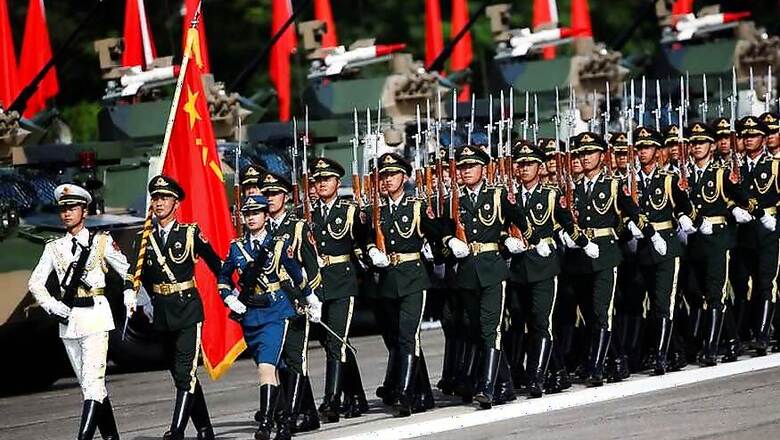
views
New Delhi: With India expressing deep concern over China constructing a road in Doklam - a disputed area between China and Bhutan - China, on Monday, cancelled an annual sponsored journalists' trip to Tibet. Alka Acharya, professor of Centre for East Asian Studies and a former member of the National Security Advisory Board of the Government of India tells News18's Aishwarya Kumar why it was about time India looked at a comprehensive, long term policy on China.The skirmishes at the Indo-China borders in last few weeks, do you think they are connected to Modi’s visit to US and his meeting with Trump?
The issue is far more complex than tough signaling because Modi is meeting Trump. China is certainly apprehensive about the kind of understanding that the US and India might be working towards, which could have a bearing on its own concerns. This, it has expressed in several articles, statements and even some official pronouncements. So that is nothing new - in fact at this point there is much uncertainty about the US commitment to India. When the news broke out, we had the Indian Army spokesmen playing this down, while China’s defence ministry continues to hurl very strong accusations of the Indian side violating the existing agreement in the matter. The formal statement from the Indian side was carefully worded to bring out Indian concerns because of the change in status quo whereas there was a major statement accusing India of violation of the Chinese border in a press briefing in Beijing. And to top it all, the current controversy involves Bhutan as well, though the Chinese have so far carefully avoided mentioning them - but also hitting out at India for acting on behalf of other sovereign countries.Do you think these are usual skirmishes or is there something unusual and alarming?
If one were to compile the "skirmishes" "intrusions" "incidents" occurring on the border, before or during high level visits - that would be an interesting narrative by itself. The difficulty with connecting these incidents with every - or almost every - high level visit is, that it gets more than the usual media coverage, gives rise to more speculation and conspiracy theories (all uncorroborated by any official quarter) and gets further irrationally linked to all other ongoing issues of tension or differences. High level visits - intending to promote the overall relationship, then get mired in controversies and generate only cynicism, legitimate concerns and problems regarding the undefined nature of the boundary, which are surfacing very frequently, become embroiled in ugly face-offs. Politically, the message from Indian government sources (and here one includes all governments, the bureaucracy, the military), on all occasions in the past is not to blame any side directly but to emphasize the undefined nature of the boundary - which leads to these transgressions.Do you think we’ve failed to assess China’s defence capacity?
Not in the least. Here I would argue that we have been keeping careful track of what all the Chinese are doing to enhance their capabilities. There is considerable hand-wringing in the Indian defence and security establishment (and within the strategic community) about how further ahead the Chinese are, how much of a better infrastructure do they have, their installations in Tibet, their military strategy, etc. In fact, what is worse is that the Chinese media has started to taunt India about this asymmetrical scenario. However, I would like to add that we give very less thought to what kind of a power China is. How do they think in terms of ‘power’? How do they intend to utilize their power? These are the questions we’ve not paid much heed to. Our neighbours are inheritors of a tradition which spoke of winning the battle without fighting. There is a tendency in India to paint a black and white picture - but I think there are more than fifty shades of grey.The worst fear of Indian security establishment is heating up of Pakistan and China borders at the same time. Do you think that is happening now?
I don’t think so. This is a rather unwarranted stretch of the imagination. The Pakistan border has been a near continuous and near permanent hot stretch. The earlier incident during Xi Jinping's visit and prior to that, just before Li Keqiang's visit - appeared to be far more serious. The Army chief is winging his way to Sikkim, presumably to get in touch with his counterpart on the other side of the border, (and of course parley with the Bhutanese) and defuse the situation. India-China relations will have to deteriorate to an alarming extent before the two-front nightmare could be seriously considered. I do not believe that the ongoing tensions - NSG membership, Masood Azhar, CPEC, OBOR - are of the order that they threaten to derail the overall trajectory of the relationship.What should be the way forward with India’s China policy?
There needs to be continuous, consistent and serious dialogue. That is the only way forward. Let us do some serious study of the boundary settlement disputes that other countries have had with China. One must seriously discuss the possibility of compromises wherever convergences are possible. We have to keep ourselves open to possibilities. Above all, public opinion has to be shaped by informed, rational and objective discourse of the problems regarding the highly contested and historically very tangled boundary disputes. Above all let us bear in mind that these borders and frontiers in the trans-Himalayan areas have extremely rich cultural, economic and spiritual legacies. We need to build on them, foster and promote them in the interests of the extremely diverse populations inhabiting those areas.


















Comments
0 comment